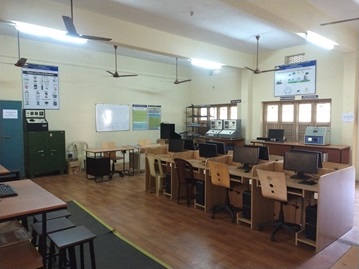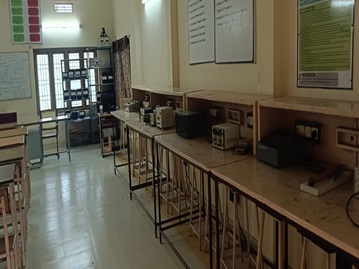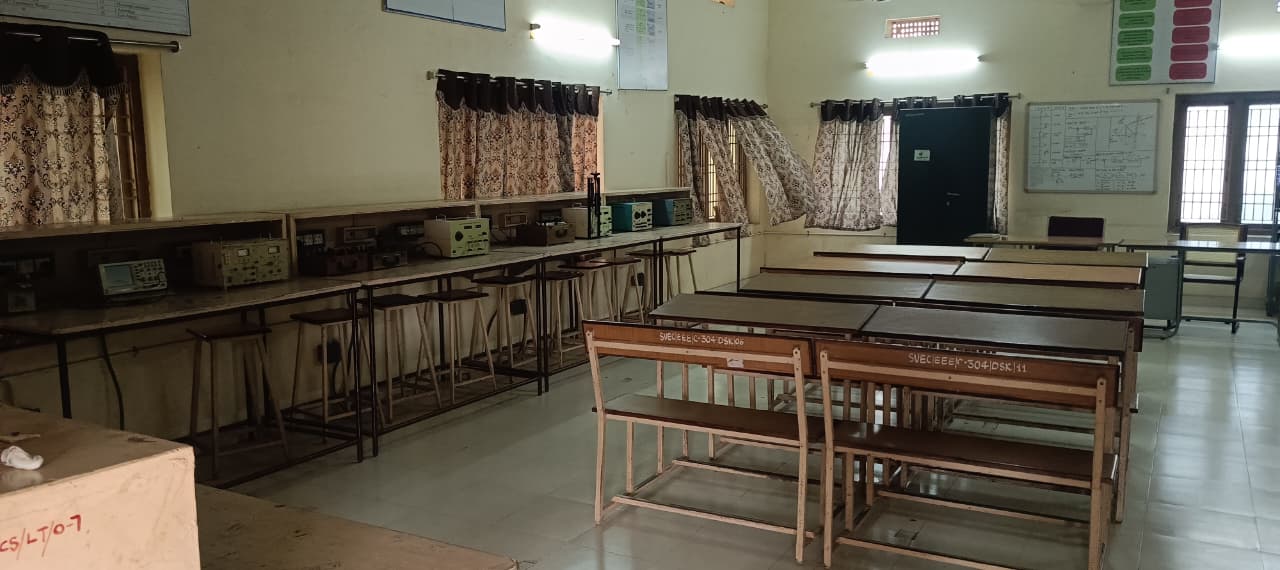EEE Department

Dr. D. Sudha Rani
Professor & Head of the Department
Phone No: 08818-284355(O)-(Ext.-337)
Email: hod_eee@srivasaviengg.ac.in
Department Profile
The Department was established in the year 2002 with an intake of 60 seats in UG-
B.Tech. Programme. From 2011 onwards the intake was increased to 120 seats and later
it was reduced to 90 seats in 2022. The three 'E' s stand for Excellence, Expertise
and Efficiency of this department. The cardinal priority is to give the students
real time experience and help them learn the true functional elements of ELECTRICAL
& ELECTRON ICS. In its journey of 21 years, it has put many assiduous efforts in
providing such training to the students. Although Electrical Engineering is a field
of engineering that generally deals with the study and application of electricity,
electronics, and electromagnetism, our department has made enormous efforts to give
an extra mileage to the students by training them on software design and
hardware-software integration so as to create more space for them in the job market.
1. The EEE Department is offering a PG - M.Tech Program with Specialization of
Power Electronics and Power Systems from 2021 with an intake of 18 Seatsand it was
reduced to 6 seats in 2022.
2. The UG Programme is accredited by NBA in 2018 for the three years (A. Y. 2018-19,
2019-20 & 2020-21) and accreditation extended for one more year (A. Y. 2021-22).
3. The UG Programme is accredited by NBA in 2023 for the three years (A. Y. 2022-23,
2023-24 & 2024-25) and accreditation extended for one more year (A. Y. 2021-22).
4. The EEE Department offered PG - M.Tech Program with Specialization of Power
Systems Control and Automation from 2013 to 2021.
5. The EEE Department offered PG - M.Tech Program with Specialization of Power
Electronics and Drives from 2009 to 2017.
Vision
To evolve as a centre of excellence in Electrical and Electronics Engineering that produces graduates of high quality with ethical values.
Mission
M1 : To impart technical knowledge through learner-centric education supplemented withpractical exposure.
M2 : To provide opportunities thatpromote personality development through co-curricular and extra-curricular activities.
M3 : To inculcate human values & team spirit that enables the Electrical and Electronics Engineers to face the future challenges.
PEOs
Graduates of the electrical engineering program within a few years of graduation will:
PEO1 : Be the practicing engineers in chosen technical fields such as designing,manufacturing and testing of various electrical systems.
PEO2 : Fulfill the needs of society by solving technical problems in an ethical, responsible and an optimal way.
PEO3 : Demonstrate professionalism through life-long learning.
POs
Electrical and Electronics Engineering Graduates will be able to:
- 1. Engineering knowledge: Apply the knowledge of Mathematics, Science, Engineering Fundamentals, and Concepts of Electrical and Electronics Engineering to the solution of complex Engineering problems.
- 2. Problem Analysis: Identify, formulate, review research literature, and analyze complex engineering problems reaching substantiated conclusions using first principles of Mathematics, Natural Sciences, and Computer Science.
- 3. Design/development of solutions: Design solutions for complex engineering problems and design system components or processes that meet the specific needs with appropriate consideration for public health and safety, and the cultural, societal, and environmental considerations.
- 4. Conduct investigations of complex problems: Use research-based knowledge and research methods, including the design of experiments, analysis and interpretation of data, and synthesis of information to provide valid conclusions.
- 5. Modern tool usage: Create, select, and apply appropriate techniques, resources, and modern engineering and IT tools, including prediction and modeling, to complex Engineering activities with an understanding of the limitations.
- 6. The engineer and society: Apply reasoning informed by contextual knowledge to assess societal, health, safety, legal, and cultural issues and the consequent responsibilities relevant to professional Engineering practice.
- 7. Environment and sustainability: Understand the impact of professional engineering solutions in societal and environmental contexts and demonstrate knowledge of, and the need for sustainable development.
- 8. Ethics: Apply ethical principles and commit to professional ethics and responsibilities and norms of Engineering practice.
- 9. Individual and team work: Function effectively as an individual and as a member or leader in diverse teams and in multidisciplinary settings.
- 10. Communication: Communicate effectively on complex Engineering activities with the Engineering community and with society at large, such as being able to comprehend and write effective reports and design documentation, make effective presentations, and give and receive clear instructions.
- 11. Project management and finance: Demonstrate knowledge and understanding of Engineering and Management principles and apply these to one's own work, as a member and leader in a team, to manage projects and in multidisciplinary environments.
- 12. Life-long learning: Recognize the need for, and have the preparation and ability to engage in independent and life-long learning in the broadest context of technological change.
PSOs
A graduate of the Electrical and Electronics Engineering Programme will be able to:
- PSO1: To contribute for the Development of green energy technologies to meet future energy demands.
- PSO2: To identify, formulate, design, investigate and operate various electrical systems.
Salient Features
➟ Accredited by NBA in 2023 for 3 years
➟ Accredited by NBA in 2018 for 3 years and accreditation extended for one more year in 2021.
➟ Accredited by NAAC with "A" Grade in the year 2016 for 5 years
➟ Provisionally accredited by 'NBA' in 2012 for 2 years.
➟ ICT enabled class rooms
➟ .MoUs with IITM, E&ICT of NITW, APSSDC and NITAP
➟ Professional Society Memberships in ISTE and IE.
➟ Good Student Faculty Ratio.
➟ Exclusive Project Laboratory.
➟ Green initiative - Institute installed 500KWp solar plant in the campus.
➟ More than 25 well qualified and experienced faculty.

Dr. D. Sudha Rani
Professor & Head of the Department
Phone No: 08818-284355(O)-(Ext.-337)
Email: hod_eee@srivasaviengg.ac.in
Department Profile
The Department was established in the year 2002 with an intake of 60 seats
in UG- B.Tech. Programme. From 2011 onwards the intake was increased to 120
seats and later it was reduced to 90 seats in 2022. The three "E" s stand
for Excellence, Expertise and Efficiency of this department. The cardinal
priority is to give the students real time experience and help them learn
the true functional elements of ELECTRICAL & ELECTRON ICS. In its journey of
21 years, it has put many assiduous efforts in providing such training to
the students. Although Electrical Engineering is a field of engineering that
generally deals with the study and application of electricity, electronics,
and electromagnetism, our department has made enormous efforts to give an
extra mileage to the students by training them on software design and
hardware-software integration so as to create more space for them in the job
market.
1. "The EEE Department is offering a PG - M.Tech Program with Specialization of
Power Electronics and Power Systems from 2021 with an intake of 18 Seatsand it was
reduced to 6 seats in 2022.
2. The UG Programme is accredited by NBA in 2018 for the three years (A. Y. 2018-19,
2019-20 & 2020-21) and accreditation extended for one more year (A. Y. 2021-22).
3.
The UG Programme is accredited by NBA in 2023 for the three years (A. Y. 2022-23,
2023-24 & 2024-25) and accreditation extended for one more year (A. Y. 2021-22).
4. "The EEE Department offered PG - M.Tech Program with Specialization of Power
Systems Control and Automation from 2013 to 2021.
5. "The EEE Department offered PG - M.Tech Program with Specialization of Power
Electronics and Drives from 2009 to 2017.
Vision
To evolve as a centre of academic and research excellence in the area of Electrical and Electronics Engineering.
Mission
M1 : To impart technical knowledge through learner-centric education supplemented withpractical exposure.
M2 : To provide opportunities thatpromote personality development through co-curricular and extra-curricular activities.
M3 : To inculcate human values & team spirit that enables the Electrical and Electronics Engineers to face the future challenges.
PEOs
PEO1 : Be the practicing engineers in chosen technical fields such as designing,manufacturing and testing of various electrical systems.
PEO2 : Fulfill the needs of society by solving technical problems in an ethical, responsible and an optimal way.
PEO3 : Demonstrate professionalism through life-long learning.
POs
Electrical and Electronics Engineering Graduates will be able to:
- 1. Engineering knowledge: Apply the knowledge of Mathematics, Science, Engineering Fundamentals, and Concepts of Computer Science Engineering to the solution of complex Engineering problems.
- 2. Problem Analysis: Identify, formulate, review research literature, and analyze complex engineering problems reaching substantiated conclusions using first principles of Mathematics, Natural Sciences, and Computer Science.
- 3. Design/development of solutions: Design solutions for complex engineering problems and design system components or processes that meet the specific needs with appropriate consideration for public health and safety, and the cultural, societal, and environmental considerations.
- 4. Conduct investigations of complex problems: Use research-based knowledge and research methods, including the design of experiments, analysis and interpretation of data, and synthesis of information to provide valid conclusions.
- 5. Modern tool usage: Create, select, and apply appropriate techniques, resources, and modern engineering and IT tools, including prediction and modeling, to complex Engineering activities with an understanding of the limitations.
- 6. The engineer and society: Apply reasoning informed by contextual knowledge to assess societal, health, safety, legal, and cultural issues and the consequent responsibilities relevant to professional Engineering practice.
- 7. Environment and sustainability: Understand the impact of professional engineering solutions in societal and environmental contexts and demonstrate knowledge of, and the need for sustainable development.
- 8. Ethics: Apply ethical principles and commit to professional ethics and responsibilities and norms of Engineering practice.
- 9. Individual and team work: Function effectively as an individual and as a member or leader in diverse teams and in multidisciplinary settings.
- 10. Communication: Communicate effectively on complex Engineering activities with the Engineering community and with society at large, such as being able to comprehend and write effective reports and design documentation, make effective presentations, and give and receive clear instructions.
- 11. Project management and finance: Demonstrate knowledge and understanding of Engineering and Management principles and apply these to one's own work, as a member and leader in a team, to manage projects and in multidisciplinary environments.
- 12. Life-long learning: Recognize the need for, and have the preparation and ability to engage in independent and life-long learning in the broadest context of technological change.
PSOs
Electrical and Electronics Engineering Graduates will be able to:
- PSO1: To contribute for the Development of green energy technologies to meet future energy demands.
- PSO2: To identify, formulate, design, investigate and operate various electrical systems.
Salient Features
➟ Accredited by NBA in 2023 for 3 years
➟ Accredited by NBA in 2018 for 3 years and accreditation extended for one more year in 2021
➟ Accredited by NAAC with "A" Grade in the year 2016 for 5 years
➟ Provisionally accredited by 'NBA' in 2012 for 2 years
➟ ICT enabled class rooms
➟ MoUs with IITM, E&ICT of NITW, APSSDC and NITAP
➟ Professional Society Memberships in ISTE and IE
➟ Good Student Faculty Ratio
➟ Exclusive Project Laboratory
➟ Green initiative - Institute installed 500KWp solar plant in the campus
➟ More than 25 well qualified and experienced faculty









































